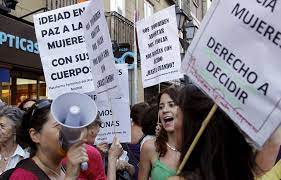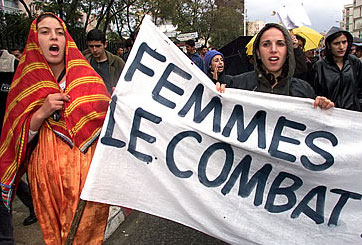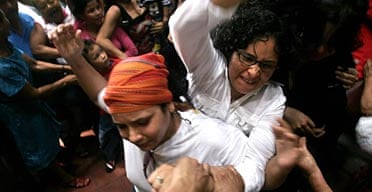
Austerity measures help neither the republic nor the democracy. They usher violence and injustice into the civil society. For women, austerity measures mean something dreadful.
In 2011, Spain elected populist conservative Mariano Rajoy from the People Party (PP), with the support of fascist groups and the ultraconservative branch of the Catholic Church. He campaigned as a strong believer in neo liberal values, particularly pushing austerity as the basis for economic policies. No matter that the so-called public debt originated from a complex association of debt and profit making through outrageous interest rates to private banks and investors. As in the United States, the message and the methods involve the religious right and the control of women’s bodies and the most vulnerable.
Once again women’s rights, immigrants’ rights, labor rights are at stake.
“Today, it is going to be impossible for women to have abortions. We expected a bad law, but this is the worst we could have imagined,” said Francisca Garcia, president of ACAI, La Asociación de Clínicas Acreditadas para la Interrupción Voluntaria del Embarazo. This worst law imaginable has overturned previous reproductive laws, and in particular the 2010 law passed under the socialist government of Zapatero, one of the most comprehensive defenses of women’ss right to control their bodies. The new law will make abortion impossible unless pregnancy threatens the woman’s life or if the pregnancy is the result of a sexual assault.
Justice Minister Alberto Ruiz Gallardon, who designed the antiabortion bill, explained: “Women are victims of abortion.” His comment shows his utter contempt for women’s intelligence and capacity to understand their bodies and their needs. He pretends that the morality of this bill rests on the defense of the unborn yet conceived child and on an economic necessity. Actually, countries, like France, that have progressive abortion laws and public services to support mothers have among the highest birth rates in the industrial world. Moreover, it goes against the European Union views on abortion rights with twenty of the twenty-eight members guaranteeing women’s right to freely decide on their pregnancy. Six EU countries have conditions on abortion but allow it. Only Malta and Ireland prohibit abortion. According to Le Monde, the Rajoy government and its campaign against abortion received funding and support from the ultraconservative Center for Bio-Ethical Reform, based in the United States with representation in Spain.
Undocumented immigrants are also targeted by Spain’s so-called reform of the health care system. They are now denied any kind of coverage under the public health care system. Amnesty International, Doctors Without Borders, and the UN Committee on Economic, Social and Cultural Rights have protested these measures. As with abortion rights, there is no rationale or morals that can justify these measures, since health is recognized as a basic human right and covering a population is both more humane and cost efficient. These bills have been designed to show the muscles of this government and its commitment to punitive public policies. By reducing public services to the bare minimum, neoliberal policies overpower human rights.
Simultaneously, Gallardon wants to `reform’ the penal system and create a life-without-parole sentence. Following the United States, he is advocating for a Patriot Act-type of security law with more restrictions applied to unions and the right to strike.
Meanwhile, demonstrations multiplied in Spain and across Europe. In Spain the police responded violently to women demonstrating for their rights. They pushed groups of women to the ground, which was filmed and triggered more protests.
Almost 25 years ago, Jacques Derrida noted, “Today the police are no longer content to enforce the law, and thus to conserve it; they invent it.” Today, the Rajoy government, no longer content, invents the law to exercise violence against women while showing a cynical contempt for the Spanish people.
To fight for these rights is to fight for the people of Spain and elsewhere against the oppressive globalized neoliberal order that, with mechanical precision, disassembles human society and turns profit-making into a State religion.
(Photo Credit: Fernando Alvarado/EFE)








